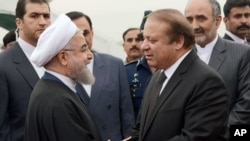Iranian President Hassan Rouhani in talks with leaders in neighboring Pakistan has pledged to enhance bilateral trade, security and energy cooperation to move the relationship forward in the wake of the removal of international economic sanctions against Tehran.
Rouhani arrived in Islamabad Friday on a two-day visit, his first to the country since taking office and held wide-ranging talks with Prime Minister Nawaz Sharif.
The two leaders briefly spoke to reporters after the meeting and announced signing of several memoranda of understanding to further enhance bilateral cooperation, in economic and social sectors.
“Our economic relations had suffered due to sanctions imposed on Iran. In our consultations today, we have reiterated our resolve to enhance the level of bilateral cooperation in diverse fields, including trade, economic and energy,” Sharif said.
He added the two sides have also decided to open two new border crossings to facilitate commercial activities and “people to people” contacts between Pakistan and Iran.
Officials expect the Iranian president’s visit will lead to exponential growth in bilateral trade which currently stands at around $250 million a year. It is expected to increase to $5 billion in the next five years.
Energy and security
Iran has also been pushing Pakistan to expedite work on a multi-billion dollar pipeline to bring Iranian gas to the neighboring country to run power plants. Tehran says it has largely completed work on its side, but Pakistani officials blame the sanctions against Iran for preventing work on their side.
President Rouhani said that in his discussions with Pakistani interlocutors, he discussed issues related to energy and export of gas or electricity to Pakistan as well as establishing connectivity between Iran's Chabahar and Pakistan’s Gawadar seaports.
Speaking through an interpreter, he said that Pakistan’s security is important for Iran’s own security. Rouhani emphasized the need for enhanced joint efforts to secure the nearly 1,000-kilometer border separating the two nations.
“It is the will and the resolve of the two countries to firmly combat against extremists and the terrorist groups not to allow them to threaten our shared borders,” Rouhani asserted.
Rouhani went on to say that in his talks with Sharif they both agreed on the need for more cooperation between Iran and Pakistan on regional security and various issues facing the Muslim world.
“And we do believe that the only solution for the regional problems and conflicts is a political one,” Rouhani said in a veiled reference to Shiite Iran’s rivalry with the Sunni kingdom of Saudi Arabia and the prolonged conflict in Afghanistan, which shares borders with both Iran and Pakistan.
The predominantly Sunni Muslim Pakistan has traditionally close economic and political ties to the Saudi rulers and Islamabad is trying to maintain a delicate balance while promoting ties with next door neighbor Iran so it does not upset Saudi Arabia.
Pakistan, having the largest and only nuclear-armed army in the Muslim world, last year refused a Saudi request to join its anti-Houthi military coalition, saying it would not become part of any alliance against Iran. The move angered Riyadh, although Islamabad vowed to stand ready to defend Saudi Arabia against any aggression.




